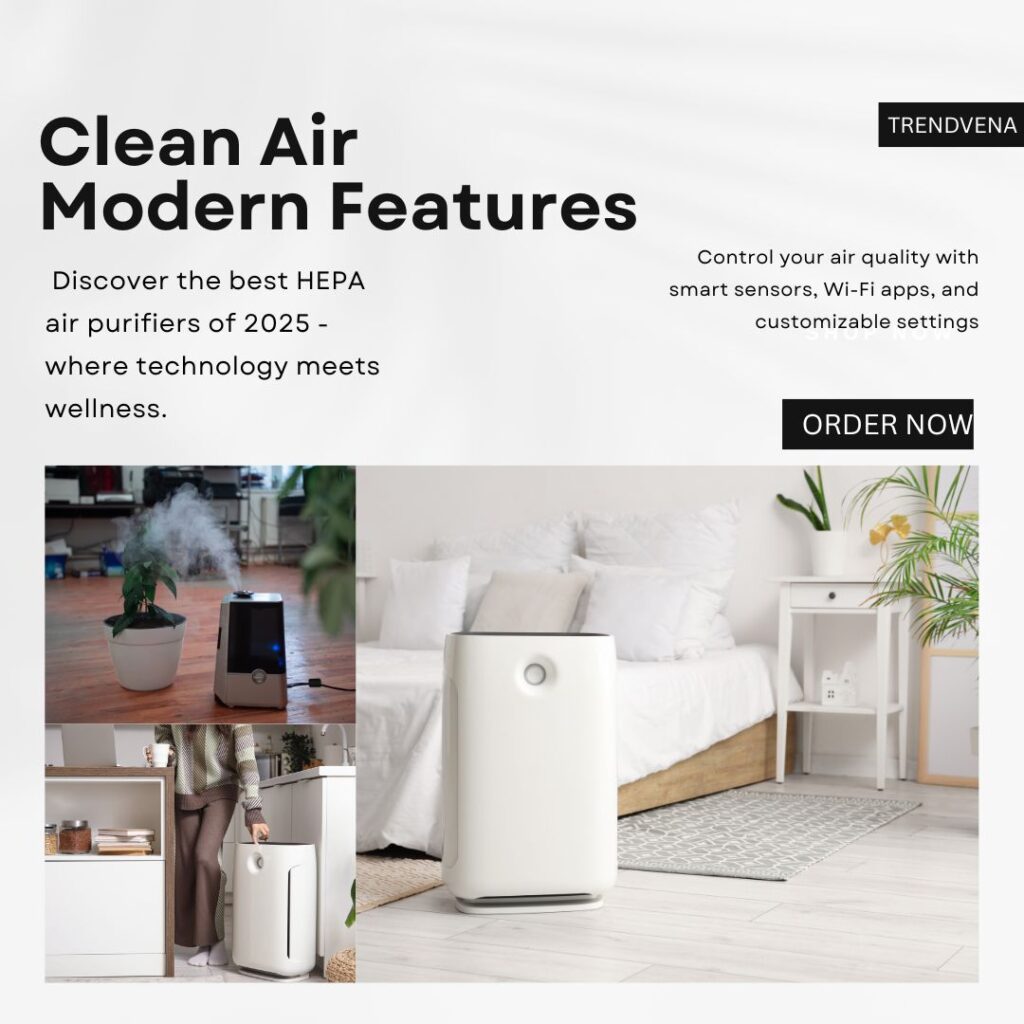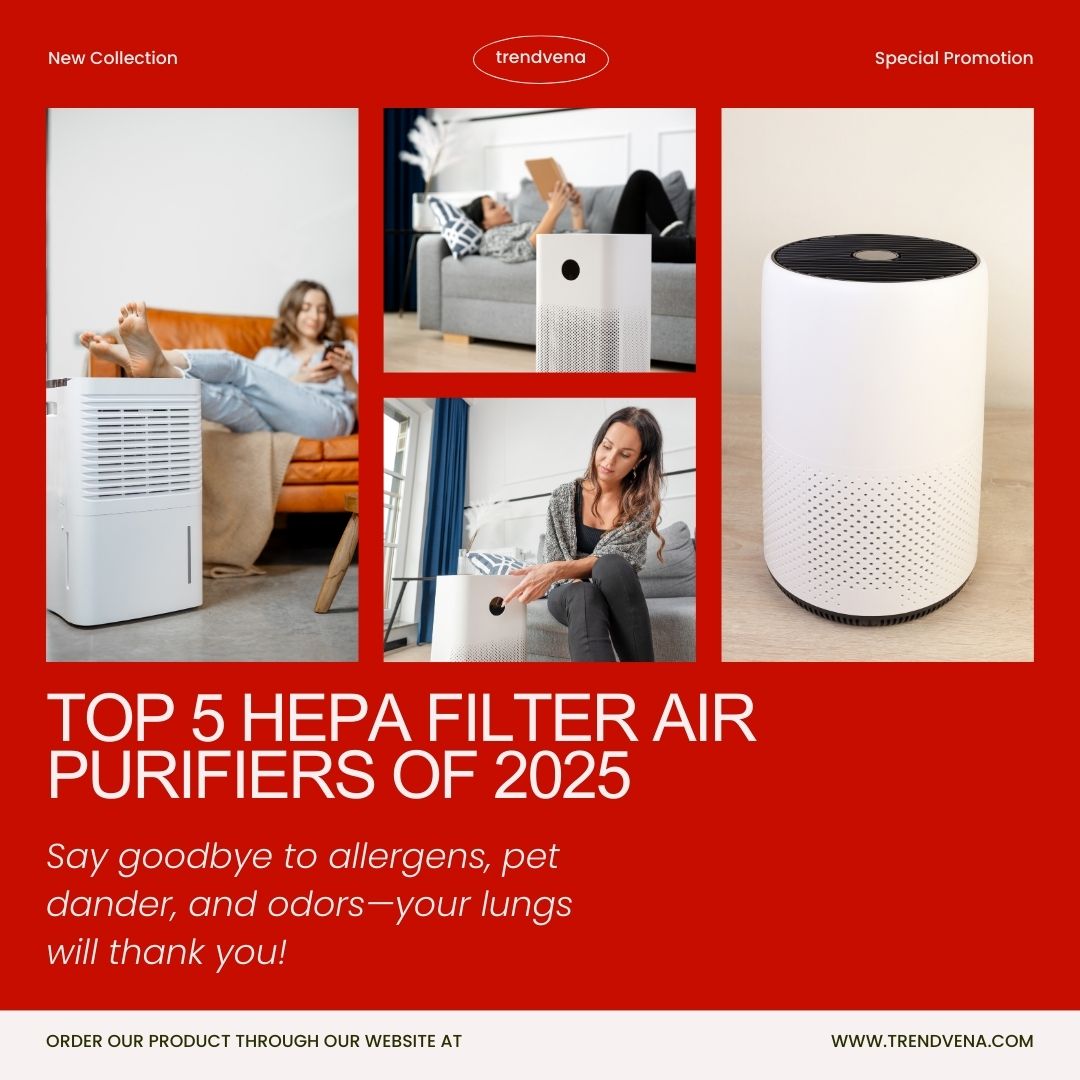Breathing clean, fresh air is essential for a healthy lifestyle—especially in today’s world where allergens, pet dander, smoke, and pollution are more common than ever. Whether you suffer from allergies, have pets, or simply want to improve the air quality in your home, investing in a reliable air purifier can make all the difference. In this comprehensive guide, we’ll explore the best air purifiers for large rooms in 2025, focusing on five top-rated models: PuroAir 240, LEVOIT Core 300-P, GermGuardian 4-in-1, LEVOIT Vital 200S-P, and MOOKA B-D02L. Each unit offers a unique combination of filtration efficiency, room coverage, noise level, and smart features.
Whether you’re dealing with allergies, pets, or just want a fresher living space, investing in the right HEPA filter air purifier can make a world of difference. In this guide, we’ll explore five of the best models in 2025, breaking down their features so you can find the perfect fit for your needs.

What Is a HEPA Filter Air Purifier?
A HEPA filter air purifier uses High-Efficiency Particulate Air (HEPA) filtration to trap up to 99.97% of microscopic particles—like pollen, dust mites, smoke, mold spores, and even bacteria. These powerful devices help create cleaner environments, especially for people with allergies, asthma, or pets.
Let’s dive into the top-rated models you should consider this year!
1. PuroAir 240 HEPA Air Purifier – Clean Up to 1,000 Sq Ft
Best For: Medium to large bedrooms and allergy-prone households
Looking for fast, effective air cleaning in a quiet package? The PuroAir 240 HEPA Filter Air Purifier might be your best friend. This unit can purify air in spaces up to 1,000 square feet in just one hour. It uses a three-layer filtration system—pre-filter, HEPA filter, and activated carbon—to remove 99.9% of pollutants like pet dander, smoke, and VOCs.
What really sets it apart is its whisper-quiet 24/7 operation and smart sensor technology that adjusts based on air quality. Certified by CARB, ETL, ISO, UL, and Energy Star, it’s a powerhouse with a sleek, user-friendly design.
✅ Key Highlights:
- Filters rooms up to 1,000 sq ft/hour
- Removes 99.9% of pollutants
- Ultra-quiet with smart air quality sensor
- 2-year warranty with U.S.-based support
2. LEVOIT Core 300-P HEPA Air Purifier – Sleek & Silent
Best For: Bedrooms, offices, and small apartments
If style and silence matter to you, the LEVOIT Core 300-P is a must-have. Covering up to 1,095 sq ft, this HEPA filter air purifier features QuietKEAP Technology that keeps it nearly silent at just 24dB in sleep mode.
It includes multiple filter options, so you can target smog, smoke, or pet allergies depending on your needs. The HEPA filter captures 99.97% of allergens as small as 0.3 microns—making it ideal for sensitive environments.
✅ Key Highlights:
- Custom filter options (smoke, pets, toxins)
- Cleans 1,095 sq ft/hour
- Whisper-quiet operation (24dB)
- Modern design blends with any décor
3. GermGuardian 4-in-1 HEPA Air Purifier – With UV-C Light for Germs
Best For: Households concerned about bacteria and viruses
This isn’t just a HEPA filter air purifier—the GermGuardian 4-in-1 model adds UV-C light to kill airborne germs and bacteria. Covering up to 743 sq ft, it combines HEPA filtration, activated carbon odor removal, and UV-C technology for maximum air purification.
It’s especially effective in eliminating household odors and keeping your space fresh and clean. Certified by ENERGY STAR, CARB, and ETL, it’s also ozone-free and safe for home use.
✅ Key Highlights:
- UV-C tech helps eliminate germs
- HEPA filter captures 99.97% of particles
- Great for large rooms (743 sq ft)
- Targets odors from pets, cooking, and smoke
4. LEVOIT Vital 200S-P – Smart Wi-Fi & Washable Pre-Filter
Best For: Tech-savvy users and pet owners
The LEVOIT Vital 200S-P is a top-tier HEPA filter air purifier with all the modern bells and whistles. It covers up to 1,800 sq ft, making it ideal for open-plan homes or spacious rooms. The washable pre-filter extends its lifespan, and the U-shaped air inlet efficiently traps pet hair and dust.
With smart Wi-Fi connectivity, you can control the purifier remotely via app. Plus, its light sensor auto-adjusts the display for nighttime comfort, while HEPA Sleep Mode keeps the noise low and air quality high while you rest.
✅ Key Highlights:
- Large coverage (1,800 sq ft)
- Smart Wi-Fi control via app
- Washable pre-filter
- Light sensor & quiet sleep mode
5. MOOKA B-D02L – Quiet & Customizable for Everyday Use
Best For: Families with kids, light sleepers, and energy-conscious users
The MOOKA B-D02L is an ultra-quiet HEPA filter air purifier perfect for households that need clean air around the clock. It covers up to 1,076 sq ft, and its 3-stage filtration system includes a True H13 HEPA filter, pre-filter, and carbon filter to tackle everything from smoke to pet dander.
Its customizable settings—like 4 fan speeds, nightlight control, and a child lock—make it a versatile option for families. It runs at a peaceful 20dB, so it won’t interrupt your sleep or work.
✅ Key Highlights:
- Ultra-quiet (just 20dB)
- Covers 1,076 sq ft
- Child lock & 4 fan settings
- Nightlight and timer features

📊 Product Comparison Table
| Product | Coverage Area | Filtration System | Special Features | Noise Level | Best For |
|---|---|---|---|---|---|
| PuroAir 240 | 1,000 sq ft | 3-layer (HEPA + Carbon) | Smart sensor, 24/7 quiet mode | Very quiet | Allergy relief, bedrooms |
| LEVOIT Core 300-P | 1,095 sq ft | HEPA with optional filters | QuietKEAP, design-focused | 24dB | Apartments, offices |
| GermGuardian 4-in-1 | 743 sq ft | HEPA + UV-C + Carbon | UV-C germ control | Moderate | Germ removal, odor control |
| LEVOIT Vital 200S-P | 1,800 sq ft | Washable pre-filter + HEPA | Smart Wi-Fi, light sensor | Low | Large homes, tech lovers |
| MOOKA B-D02L | 1,076 sq ft | H13 HEPA + Carbon | Child lock, 4 speeds | 20dB | Families, kids’ rooms |
Frequently Asked Questions About HEPA Filter Air Purifiers
1. What is a HEPA filter and why is it important in air purifiers?
HEPA stands for High-Efficiency Particulate Air. A HEPA filter captures at least 99.97% of airborne particles as small as 0.3 microns. This includes dust, pollen, pet dander, smoke, and even some bacteria. HEPA filter air purifiers are essential for improving indoor air quality and are especially helpful for people with allergies or asthma.
2. Can a HEPA filter air purifier remove smoke and pet odors?
Yes, many HEPA filter air purifiers, like the PuroAir 240 and MOOKA B-D02L, also include an activated carbon filter. This layer is designed to absorb smoke, pet odors, cooking smells, and volatile organic compounds (VOCs), making the air in your home fresher and healthier.
3. How often should I replace the HEPA filter in my air purifier?
It depends on the model and usage, but generally, HEPA filters should be replaced every 6–12 months. Some models, like the LEVOIT Vital 200S-P, come with washable pre-filters that help extend the life of the HEPA filter.
4. Are HEPA filter air purifiers effective for large rooms?
Absolutely! Devices like the LEVOIT Vital 200S-P and PuroAir 240 are designed to cover large rooms, up to 1,800 sq. ft. and 1,000 sq. ft. respectively. Always check the CADR rating and square footage coverage to ensure the air purifier matches your space.
5. Do HEPA filter air purifiers help with allergies?
Yes, HEPA filter air purifiers are one of the best tools for reducing allergy symptoms. They capture airborne allergens like pollen, dust mites, pet dander, and mold spores. This creates a cleaner breathing environment for allergy-prone individuals.
6. Can I run my air purifier all day and night?
Yes, most modern HEPA filter air purifiers, such as the GermGuardian 4-in-1 and LEVOIT Core 300-P, are designed for 24/7 operation. They’re energy-efficient and include quiet or sleep modes, so you can use them around the clock—even in bedrooms.
7. Do HEPA filter air purifiers make a lot of noise?
Not at all. In fact, many air purifiers like the MOOKA Air Purifier and LEVOIT Core 300-P operate at whisper-quiet noise levels (as low as 20–24 dB). They’re perfect for sleeping, working, or relaxing without disturbance.
8. Can I use a HEPA filter air purifier for pet hair and dander?
Yes! HEPA filter air purifiers are excellent for pet owners. Devices like the LEVOIT Vital 200S-P and LEVOIT Core 300-P even offer pet-specific filters that target dander, odors, and hair, keeping your air clean and your home smelling fresh.
9. What certifications should I look for in a HEPA air purifier?
Look for certifications like Energy Star, CARB, ETL, UL, and ISO lab testing. For example, the PuroAir 240 is certified by all these organizations, ensuring safety, energy efficiency, and proven air-cleaning performance.
10. Do HEPA filter air purifiers require a lot of maintenance?
Not really. Most maintenance involves cleaning or replacing filters. Some purifiers, like the LEVOIT Vital 200S-P, have washable pre-filters, making upkeep easier. Always refer to the manufacturer’s instructions for proper care and filter replacement intervals.
Final Thoughts: Which HEPA Filter Air Purifier Is Right for You?
Choosing the right air purifier depends on your specific needs:
- For Smart Control and Large Rooms: Go for the LEVOIT Vital 200S-P.
- For Balanced Performance and Certification: The PuroAir 240 is your best bet.
- For Odor and Germ Elimination: Choose the GermGuardian 4-in-1.
- For Budget and Quiet Needs: The MOOKA B-D02L offers excellent value.
- For Customizable Filtering: Opt for the LEVOIT Core 300-P.
Each of these air purifiers has been built with specific users in mind—whether it’s the tech-savvy homeowner, a pet parent, or someone suffering from allergies. By understanding what each model excels at, you can confidently choose the best one for your home.
This post contains affiliate links, meaning I may earn a commission if you make a purchase at no extra cost to you. For more details, please check my Disclaimer Page.

DM Sohel Rana is a seasoned product reviewer and content creator with over six years of hands-on experience in health, fitness, pet care, skincare, and everyday consumer products. Since 2019, he has been dedicated to testing, analyzing, and sharing honest insights based on real-life use, helping readers make smarter purchasing decisions.
With a strong focus on research-backed reviews and practical guidance, Sohel blends personal experience with expert-level evaluation to deliver trustworthy content. His work reflects a commitment to transparency, authenticity, and reader-first value ; ensuring every recommendation is practical, safe, and reliable.
When he isn’t reviewing products, Sohel enjoys exploring wellness trends, caring for pets, and discovering innovative solutions that simplify everyday life.


